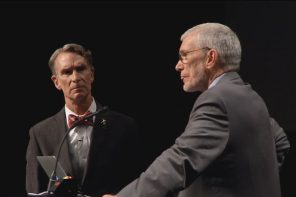Anti-Semitism lurks around the Trump campaign, and every week seems to bring a new not-necessarily-a-scandal-but-
And now there’s the case of Joseph Schmitz, one of Trump’s top national security advisors. On Thursday, McClatchyDC reported that Daniel Meyer, an intelligence official, has filed a formal complaint alleging that Schmitz made anti-Semitic remarks and targeted Jewish employees during his tenure as the Inspector General of the Department of Defense.
Speaking with McClatchyDC, Schmitz maintained his innocence. What’s particularly striking, though, is the way that Schmitz made an appeal to biological ancestry as evidence that he doesn’t express anti-Semitic sentiments:
“I do not recall ever even hearing of any ‘allegations of anti-Semitism against [me],’ which would be preposterously false and defamatory because, among other reason(s), I am quite proud of the Jewish heritage of my wife of 38 years,” he wrote in an email.
Later in a phone interview, he said his wife was not a practicing Jew but “ethnically Jewish” because her maternal grandmother was a Jew.
Of course, it is possible to express [insert flavor of bigotry here] even if you have friends, relatives, partners, or a spouse who identify as part of [group that is the target of that bigotry]. It’s a close cousin to the “some of my best friends are [insert group]” defense.
In this case, Schmitz is making his case in Jewish legal terms. Under traditional interpretations of Jewish law, membership in the Tribe is matrilineal, meaning that (although it’s complicated and somewhat contested) a person with a single Jewish grandparent is Jewish, as long as that grandparent is the maternal grandmother.
Schmitz is clearly trying to evoke this tradition in order to claim that there’s no way he’s an anti-Semite. And maybe he’s not! But there are reasons to find this appeal to ancestry more than a little off-putting.
First of all, it ignores an enormous, ongoing internecine throwdown taking place over what it means to be “ethnically Jewish” (if I may quote Schmitz). Orthodox Jews and the Conservative Jewish movement stand by matrilineality as the standard. But Reform Judaism, the largest Jewish movement in the United States, recognizes patrilineal descent as well, and there are Conservative and traditionalist Jewish communities that try (often unofficially) to be welcoming to both matrilineal and patrilineal Jews.
In other words, there’s not a hard-and-fast, universally-accepted biological rule for what makes someone a Jew.
Second of all, American Jews tend to be fairly skeptical toward the idea that you can have (at least) one Jewish grandmother, entirely walk away from Jewish tradition, and still claim a Jewish identity. In a major survey of American Jews a few years ago, the Pew Research Center asked American Jews whether it was possible to still be Jewish if you accept Jesus as the messiah. Despite the matrilineal legal technicalities, a substantial majority said No.
The larger point here is that ethnic identity is complicated. While some Jews are willing to understand Jewishness exclusively in ancestral terms, for most of us, Jewish ethnicity is a much more tangled interplay between ancestry and practice—between those components of identity that are developed through action, personal choice, and social performance, and those components of identity that are bestowed by birth.
I don’t know Schmitz’s wife, and it’s not for me to judge how she does or does not engage with particular parts of her heritage. But there’s something discomfiting about Schmitz’s appeal to exculpation-through-genetics. Accused of anti-Semitism, he’s appealing to exactly the principle that many modern Jews have worked so hard to flee: that regardless of belief and action, there is something essential, absolute, and defining in the bodies of Jews.
But more simply: the Some of my best spouses are ethnically Jewish! defense doesn’t make the charges sound as preposterous as Schmitz might believe.




